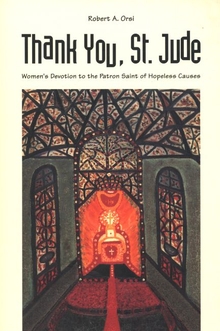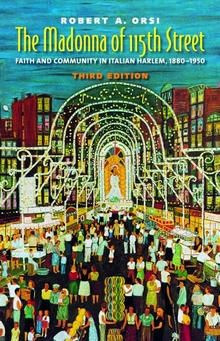Thank You, St. Jude
WARNING
You are viewing an older version of the Yalebooks website. Please visit out new website with more updated information and a better user experience: https://www.yalebooks.com
Women`s Devotion to the Patron Saint of Hopeless Causes
Robert A. Orsi
Robert A. Orsi tells us that the women who were drawn to St. Jude—daughters and granddaughters of immigrants from southern and eastern Europe and Ireland—were the first generations of Catholic women to make lives for themselves outside of their ethnic enclaves. Orsi explores the ambitions and dilemmas of these women as they dealt with the pressures of the Depression and the Second World War, made modern marriages for themselves, entered the workplace, took care of relatives in their old neighborhoods, and raised children in circumstances very different from those of their mothers and grandmothers. Drawing on testimonies written in the periodicals devoted to St. Jude and on interviews with women who felt their lives were changed by St. Jude's intervention, Orsi shows how devotion to St. Jude enabled these women to negotiate their way amid the conflicting expectations of their two cultures—American and Catholic.
Robert A. Orsi, professor of religious studies at Indiana University, is also the author of The Madonna of 115th Street, published by Yale University Press.
"A superb and gracefully written book that will significantly advance the study of American popular religion."—Catherine L. Albanese, University of California, Santa Barbara
"A provocative and fascinating book. . . . A riveting social history which illuminates the rift between the male religious hierarchy and the predominantly female laity."—Victoria R. Sirota, Los Angeles Times
"[An] engaging social history. . . . Orsi's book takes a fascinating and compelling look at American's culture and religious history."—Publisher's Weekly
"A finely textured narrative that conveys a real fidelity to the spiritual history of "the immigrants' daughters" who rescued a saint from obscurity."—James T. Fisher, Commonweal
"The voices of Jude's devout female followers ring through in Orsi's narrative, and, together with Orsi's own measured observations, they leave us with a far richer understanding of the relationship between piety and the cultivation of female agency and identities. In this engaging and accessible volume, Orsi has raised questions that will occupy students and scholars in American history, women's history, and religious studies for years to come."—Choice
"St. Jude is a fascinating phenomenon. We should be grateful to Robert Orsi for bringing him out of his obscurity."—Christian Tyler, Financial Times
"An imaginative work of scholarship which looks at the immigrant women who have been drawn to St. Jude. Traces the cult of St. Jude from about 1930 and shows how devotion to this particular saint helped women determine their place in American society."—Living Church
"A wonderful book about the particular phenomenon of prayers of American women who have prayed to St. Jude. This book is a remarkable blend of serious scholarship and insightful and entertaining probing into the widespread popularity of a saint who, prior to the Depression, was 'all but completely unknown' in the United States."—Leo Luke Marcello, America
"Orsi navigates a clear path between his presentation of the confidence that St. Jude inspired in his devotees and a tender analysis of both the positive and negatives possible in a relationship of this nature. Through interviews, correspondence and the thousands of letters that were left at the Shrine of St. Jude he was able to ascertain the special intimacy with which women approached this saint and explains how what he calls 'devotional triangles' were constituted whereby a woman's devotion began to include at last rudimentary support form the men in her life."—David Miller, Journal of Religion and Culture
"This book will be of interest to all who are concerned with the influence of religious faith and practice on the lives of 'ordinary' women."—Faith and Freedom
"Jude is still an important figure for a portion of present-day Catholics, and surely an essential one for understanding the recent Catholic past. Robert Orsi's splendid book, which is far more complex and subtle in its argument than a brief review can suggest, helps to open that recent past to our understanding and, ultimately, our appreciation."—Leslie Woodcock Tentler, The Catholic Historical Review
"Orsi's uncanny ability to comprehend the devout female followers of the patron saint of hopeless causes makes his book not only an engrossing interpretation of American Catholic devotional culture but also an intriguing attempt to defy the limits of religious studies methodology."—R. Scott Appleby, Christian Century
"An impressive, engaging and readable study in the still largely underappreciated field of popular Catholicism."—Michael J. Daley, St. Anthony Messenger
"More than any other book we've read, Thank You, St. Jude suggests a model for talking about women's experiences when those experiences could be described as unglamorous at best, exploitations of the credulity of women at worst. . . . Future scholars of women's devotional lives will most certainly turn to Orsi's approach for clues on how to proceed."—Books & Culture
"Orsi has written a remarkable book about how American Catholic women were denied their voices, and then found them again within the context of a devotional cult to an obscure saint. . . . A respectful and provocative book with much to say about the lives of American Catholic women."—Mary Jo Neitz, Sociology of Religion
"As an account of the social construction of a popular religious devotion, the study is a significant and compelling contribution to the growing literature on American Catholic religious life. Even more valuable, however, is the critical insight it brings to the exploration of popular religion in its most personal and intimate form: the prayer lives of the faithful. . . . Incisive and innovative, Thank You, St. Jude opens up multiple avenues of research that other scholars might profitably pursue."—Kathleen M. Joyce, Church History
"The result of this labor is a fascinating window into the manner in which devotion to St. Jude empowered women to assert their own independence amidst the conflicts of their ethnic immigrant community and their new American culture."—Paul C. Kemeny, Calvin Theological Journal
"Thank You, St. Jude is exemplary in its precise prose and jargon-free treatment of complex issues; its fusion of personal anecdote and historical context; its place for the voices of anonymous women. . . . Saints have a long history in Christianity. Orsi's contribution is to unravel how a modern cult is created and sustained by reciprocity."—Paula Kane, Reviews in American History
"This is an important and wonderful book."—Cross Currents
"The prizewinning author of The Madonna of 115th Street, may have done it again. Thank You, St. Jude is another carefully wrought study based on extensive evidence studied by thought-provoking methods."—Mary Elizabeth Brown, Catholic Southwest: A Journal of History and Culture
"How did [Jude Thaddeus, Saint of Hopeless Causes] virtually unknown before 1929, capture the heartfelt and faithful devotion of millions of women? What specifically did the then-obscure Saint Jude offer to daughters and granddaughters of Catholic immigrants making their way in the land of opportunity? Why was the cult that formed around Saint Jude so intensely personal and so exclusively female? Orsi addresses these questions in his excellent book, Thank You, St. Jude, which combines social history, testimonials, and astute analysis to uncover both the interlocking sources and the enduring legacy of the devotion to St. Jude. . . . Beautifully written, well researched, and amply documented, the book is accessible to a broad audience and deserves attention from both scholars across various fields and the general public."—Kathleen Waller, Journal of Religion
"A dazzling work, a masterpiece, a classic—creative, moving, and utterly original. This is the best book on saints I've ever read."—Andrew M. Greeley
Publication Date: November 10, 1998
14 b/w illus.









